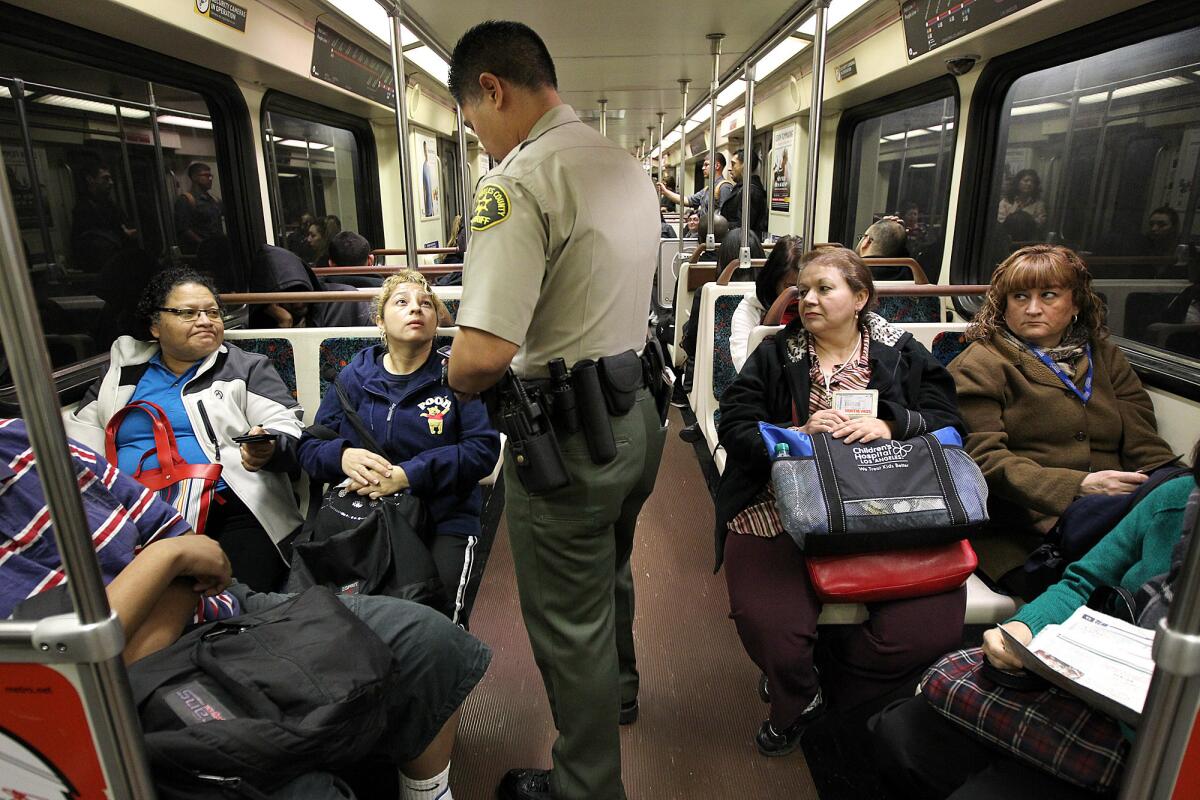L.A. County Sheriff’s Department not meeting Metro policing goals

- Share via
The Los Angeles County Sheriff’s Department has failed to meet goals for reducing violent crime on the Metropolitan Transportation Authority’s sprawling bus and rail system and been unable to adequately track emergency response times and fare evasion rates, according to a new audit.
The report, written by an outside firm and commissioned by Metro officials, found other management and safety problems over the last five years of contracted Sheriff’s Department service that had cost the transit agency more than $365 million. The criticisms come as officials weigh awarding a three-year security contract expected to cost about $400 million.
“We can have more effective law enforcement than we have right now,” Los Angeles Mayor and Metro Chairman Eric Garcetti said. The audit “raises a lot of fair questions,” he said.
The Sheriff’s Department was tasked with reducing crime on the Metro system by 8% a year, but total reported assaults, robberies and other crimes increased 28% in 2012 and 8.5% in 2013, according to audit data. Over a four-year study period, aggravated assaults climbed 75% to 280 in 2013, while robberies increased 43% to 407, according to FBI statistics included in the study.
Violent crime statistics reported to the FBI were as much as 22% higher than figures the Sheriff’s Department reported to Metro, according to the audit. The difference, the audit said, is that federal statistics require that multiple victims of assault and theft be reported as separate crimes, while Metro does not. The figures reported to Metro and the FBI also do not include crimes handled by other local police agencies.
In a response included in the audit, the Sheriff’s Department said monthly Metro reports have been revised to meet federal standards.
Without a coordinated policing plan for the countywide transit system, deputies have not been able to help passengers with questions and do not have a “felt presence” on trains and buses, the report said. It also found that the department has no way to quickly route emergency calls to other law enforcement agencies when their assistance is needed.
Sheriff’s Department response times appeared to meet Metro contract requirements, but paint a misleading picture, the auditors wrote. They said that’s partly because the department begins tracking response time when a deputy is dispatched, not when a call for help is received.
Sheriff’s officials said that their response times met contract requirements and matched the department’s standard, and that they would work to “streamline Metro call center operations.”
Metro also had asked the Sheriff’s Department to reduce fare evasion on buses and rail to 2% of passengers — less than half the most recent estimates of fare jumping. But neither the Sheriff’s Department nor Metro have been able to reliably measure fare evasion, the report said. Among other things, a mobile phone app deputies use to check fares was found to be ineffective, the report said.
Sheriff’s officials said they expect to receive new fare-checking devices this month.
The auditors also cited a lack of adequate rider surveys to measure how customers feel about the safety of the transit system. One recent Metro survey found one in five riders felt unsafe due to sexual harassment. “If there’s a feeling that people aren’t safe, that affects our ridership,” Garcetti said.
The Sheriff’s Department recently created a separate division for transit policing, mirroring the structure of other large transit police forces across the country. They added that a coordinated policing plan was being developed and that deputies were being reminded of their responsibilities at regular meetings.
The audit faulted Metro for weak oversight of the contract, but also noted some improvement in recent months, including more fare checks and citations.
Some enforcement problems, auditors found, stem from a view among deputies that patrolling buses and trains is “punishment,” with “lesser prestige” than other assignments.
The audit also called into question billing practices of the Sheriff’s Department. For example, the department did not provide as many officers as the contract required, and in some cases, billed for vacant positions. The Sheriff’s Department said that while staffing levels fluctuate seasonally, spreading billings evenly throughout the year is most efficient. The department said it would “work with Metro to clarify any and all discrepancies.”
More to Read
Sign up for Essential California
The most important California stories and recommendations in your inbox every morning.
You may occasionally receive promotional content from the Los Angeles Times.











